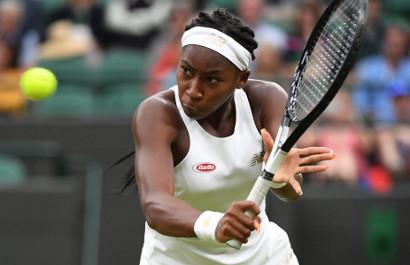You are here
- Home
- Cori Gauff: the support network behind 15-year-old who beat Venus Williams at Wimbledon
Cori Gauff: the support network behind 15-year-old who beat Venus Williams at Wimbledon

Until recently, it seems likely that only dedicated tennis fans had heard of Cori Gauff: the second youngest winner of the Junior French Open in 2018, she was one to watch – but it’s unlikely anyone predicted just how fast her star would rise. Yet the youngest player in the professional era to qualify for the main draw at Wimbledon somehow did the unthinkable. She knocked out her tennis hero in the first round: none other than Venus Williams, who has seven Grand Slams, 45 titles and 670 overall wins and a 20 year career to her name.
At 15 years old, Cori Gauff is undoubtedly the new kid on the court. Born in Atlanta, Georgia, Gauff came to tennis relatively late and didn’t start to play until she was seven years old, unlike many young players who start as early as three. And while tennis experts observed her lethal serve and hooked topspin, what’s perhaps most impressive when watching the youngster is her maturity and the composure with which she carries herself.
She plays with experience and intelligence and appears to be very grounded in her approach to the game. She’s been cited as saying:
I just literally don’t play with any pressure. I just tell myself whatever happens happens. I mean, my motto is just, like, wing it.
And perhaps it’s easy to not feel pressure when you are only 15 years old and ranked outside of the top 300 in the game, with nothing to lose. Yet it’s not uncommon for young athletes to feel so much pressure they succumb to burnout and withdraw from sport. Gauff’s parents seem aware of this risk, and by making efforts to provide her with the right support, they are consciously protecting her from burning out.
Strength through support
Having a robust support network can have an overwhelmingly positive impact on all aspects of an athlete’s development and performance. Studies now recognise that, for a young athlete to be successful, parents, coaches and team-mates all have a vital role to play.

It’s got to be fun. Shutterstock.
Researchers suggest that it’s fundamental for this support network to be established early on in the athlete’s career, since social support in particular has a powerful influence on young people’s experiences of sport, especially in connection to motivation, participation and athletic development. Young athletes are often unaware or naïve about the challenges they may face in a professional sports setting, for example a sports injury.
That said, support comes in many different guises. Earlier research has concluded that that there are four broad dimensions of social support: emotional (feeling cared for by others), esteem (bolstering their sense of competence), informational (solutions to problems) and tangible (concrete assistance). Each of these dimensions tend to be filled by different people in an athlete’s support network.
Parent power
A good example of this is how parents often play the largest role in this support network when athletes are still relatively young, and are likely to give a combination of emotional and tangible support. This emotional support is illustrated perfectly by Cori’s mother, Candi Gauff, who has said she is focused on Cori being healthy and happy:
When I look at her, I am looking for her emotions, her facial expression, to see if she is a happy individual… I want to raise children who are happy and appreciative.
Gauff’s coach Patrick Mouratoglon a key figure in her support network and her predominant source of informational support has recognised the commitment of her parents, noting how even early in her career they did all they could for her. This dedication – combined with their desire to ensure her upbringing is as normal as possible – could be credited with keeping Gauff grounded. She has a core group of people, mostly made up of extended family, who surround her, protect her and reiterate how important it is for her to remain humble and grateful.
It’s an approach that clearly works: since her victory over Williams, Gauff has maintained her composure even under the media spotlight.
Gauff appears to be on the path to greatness. She is being allowed to grow in a balanced environment where she is still made to tidy her room and do her homework and, most importantly, be a child. This healthy environment, together with a committed support network with her parents at the heart, suggest we are may be seeing a future Wimbledon champion in the making.
Candice Lingam-Willgoss, Lecturer in Sport & Fitness, The Open University
This article is republished from The Conversation under a Creative Commons license. Read the original article.
Quarterly Review of Research
Read our Quarterly Review of Research to learn about our latest quality academic output.

Contact our news team
For all out of hours enquiries, please telephone +44 (0)7901 515891
